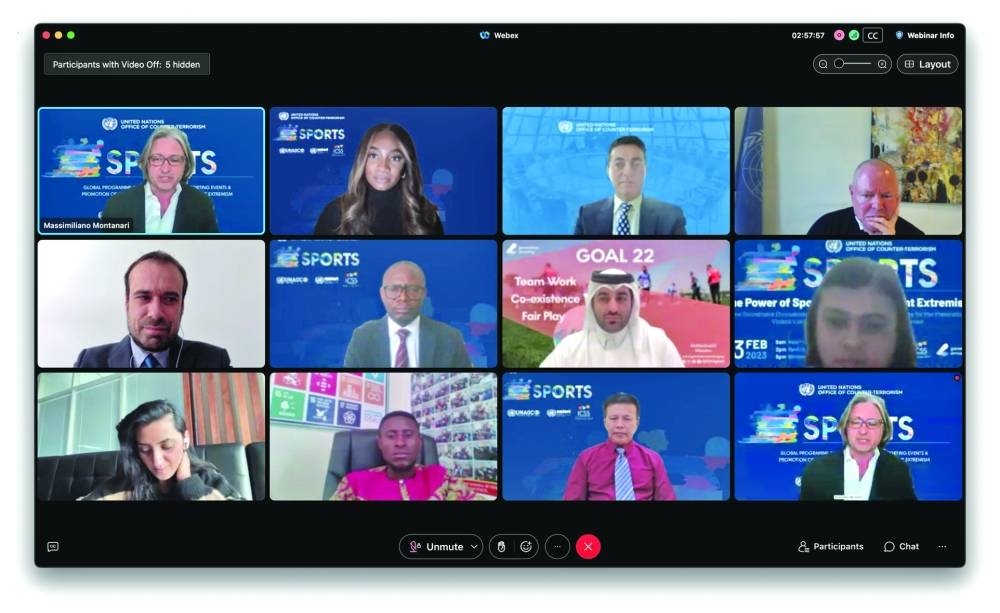The International Centre for Sport Security (ICSS) joined its partners in the Global Sports Programme, led by the United Nations Office of Counter-Terrorism (UNOCT), in partnership with the UN Interregional Crime and Justice Research Institute (UNICRI) and the UN Alliance of Civilisations (UNAOC) in a virtual roundtable on the power of sport to prevent violent extremism (PVE). Organised on the occasion of the first commemoration of the International Day for the Prevention of Violent Extremism as and when Conducive to Terrorism, the event brought together professional athletes, civil society organisations, youth leaders and representatives from international organisations, sport federations and member states.
Building on the UNOCT-led Global Sports Programme’s #MoreThanAGame campaign, the roundtable provided a platform for in-depth discussion on sport-based PVE policy-making and activities, grassroots Sports-for-Development (S4D) tools as well as the role of athletes and sporting events in fostering peaceful, inclusive and prosperous societies. Opening the event, Mauro Miedico, UNCCT deputy director and chief of the Special Projects and Innovation Branch, stressed that sports events are often targeted by terrorist groups because of the values that they represent.
“But sport can also play a unique and compelling role in building resilient societies and preventing attraction to violent ideologies, as sport has the power to convey essential values of tolerance, respect, inclusion and solidarity that can work against the drivers of radicalisation, which lead to violent extremism,” he added.
Massimiliano Montanari, CEO of ICSS, said: “While paying a tribute to the International Day for the Prevention of Violent Extremism as and when Conducive to Terrorism, we are joining this event to remind ourselves that every single day matters in the fight against violent extremism. We are building the house of dialogue brick on brick, by paving the path of social inclusion and empowering youth leaders through the values of sport.”
Leif Villadsen, deputy director of UNICRI, noted: “In highlighting the vital experience and hard work of civil society organisations implementing sport-based PVE projects, this roundtable has been an important platform for collaboration and learning among stakeholders.”
Bram Van Haver, speaking on behalf of Miguel Angel Moratinos, high representative, UNAOC, said: “Sport is a key tool to prevent violent extremism as it transcends geographical borders. The universal popularity of sport presents an opportunity to attract and mobilise people of all ages, cultures and religions, making it a unique peacebuilding tool.”
Jassim al-Ali, Events director, Generation Amazing Foundation (GA), added: “Youth organisations can play a very critical role in resilience against violent extremism. Through the power of sport, we can drive young people to impact change in their communities through these organisations.”
Samantha Johnson, sports anchor at Al Jazeera. engaged participants in a conversation on how sports can positively influence lives across borders, generations and communities and foster resilience to violent extremism and hate narratives. Isabella Echeverri, Colombian football player and ambassador for the Save the Dream movement, said athletes are role models on and off the pitch.
Sharing her personal story, Khalida Popal, former captain of Afghanistan’s women’s football team and founder and director of Girl Power Organisation, said: “Growing up in a male-dominated country and a war zone, football proved that it can bring unity and create a safe space for women to talk about the issues they were facing in Afghanistan. (...) Now being a refugee outside of my country and facing challenges between minorities and local communities, I am again trying to use sport as a tool to bring people together.”
“Sports introduced me to people with different nationalities, cultures and religions. That introduction changed my life. On the pitch we play as a team and have the same goals. These sports values can be easily transferred from the pitch to the community” said Masereka Wilber, a refugee from the Democratic Republic of Congo who participated in a sports programme by the Integrated Community Development Initiative and previously shared his story as part of the #MoreThanAGame campaign.
Commemorating the International Day, UNOCT - through its Behavioural Insights Hub in Doha and Global Sports Programme - launched an exclusive sports podcast series, 'Power of the Pitch'. The podcast examines how behavioural insights are being applied to sports and when addressing violent extremism factors that may be conducive to terrorism

From the virtual roundtable
